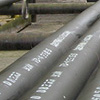

Hunan Standard Steel Co.,Ltd es uno de los miembros de Husteel Industry Group, como fabricante profesional de tuberías y accesorios de tubería de acero dulce, que tiene un sistema completo de producción ... Más
Fábrica GrupoAdvantages and Disadvantages of Pipeline Transportation
fecha:2016-07-22
Vista:23259
Pipeline transportation with the growth in oil and gas production and developed, has become the main mode of transport onshore oil and gas transport pipeline in recent years, solid materials, such as coal, ore pipeline transport, is also a great the development of pipeline transport advantages are: (1) transport capacity, a foreign coal pipeline diameter 720 mm, and a year to transport 20 million tons of coal, equivalent to almost one-directional transmission capacity of a single-track railway; (2) small amount of traffic engineering, small footprint, pipeline transportation just laying pipelines, construction of pumping stations, construction of railways is much smaller than the earthwork and the plains are mostly buried under, does not occupy farmland; (3) energy consumption in various modes of transport is the lowest; (4) safe, reliable, non-polluting, low cost; (5) the climate, and all-weather transport, high reliability and delivery of goods (6) pipeline can take shortcuts., short distance transport; (7) can be closed transport, less wear and tear.
The disadvantage of pipeline transportation are: (1) specific and strong, can only transport oil, natural gas and solid slurry (such as coal), but in the field it occupies, with a fixed and reliable market; (2) pipeline from input the magnitude of the amount of the highest traffic among small, so in the early field development, the use of pipeline transportation difficulties, but also to road, rail, sea and land transportation as a transition. (3) the construction of pipelines, gas stations and oil storage device has to spend huge investment. In addition, the pipeline route through a set dressing, unregulated traffic room, small transport elasticity, flexibility is poor.
The disadvantage of pipeline transportation are: (1) specific and strong, can only transport oil, natural gas and solid slurry (such as coal), but in the field it occupies, with a fixed and reliable market; (2) pipeline from input the magnitude of the amount of the highest traffic among small, so in the early field development, the use of pipeline transportation difficulties, but also to road, rail, sea and land transportation as a transition. (3) the construction of pipelines, gas stations and oil storage device has to spend huge investment. In addition, the pipeline route through a set dressing, unregulated traffic room, small transport elasticity, flexibility is poor.
- Anterior : Types of ERW Welding
- próximo : Advantages of Hot Rolling
























